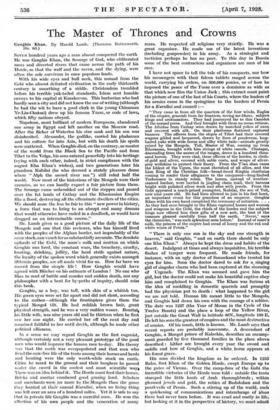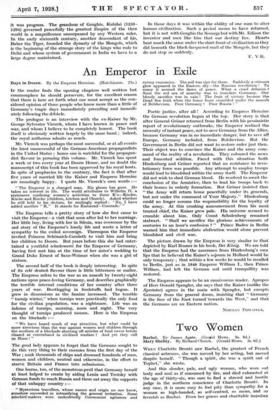The Master of Thrones and Crowns
SEVEN. hundred years ago a man almost conquered the earth He was Cenghis Khan, the Scourge of God, who obliterated races and diverted rivers that came across the path of his Horde, so that the wolf and the ravel, and the dying, were often the sole survivors in once populous lands.
With his wide eyes and bull neck, this nomad from the Gobi who almost defeated civilization in the early thirteenth century is something of a riddle. Christendom trembled before . his terrible yak-tailed standards, Islam sent humble envoys to his capital at Karakorum. This barbarian who had hardly seen a city and did not know the use of writing (although he had the wit to have a good clerk in the young Chinaman Ye-Liu-Chutsai) drew up his famous Yassa. or code of laws, which fifty nations obeyed.
Napoleon, -most brilliant of modern Europeans, abandoned one army in Egypt and left another on the Moscow road. After the flicker of Waterloo his star sank and his son was disinherited. Alexander, the godlike, carried his phalanxes and his culture far into Asia, but with his death his spoils were scattered. When Genghis died, on the contrary, as master of the world from the Black Sea to the Pacific and from Tibet to the Volga, his sons entered peacefully into his heritage (vying with each other, indeed, in strict compliance with the august Kha Khan's wishes), and two generations later his grandson Kubilai (he who decreed a stately pleasure dome where " Mph the sacred river ran ") still ruled half the world. Now most of the historians of the Mongols were their enemies, so we can hardly expect a fair picture from them. The Scourge came unheralded out of the steppes and passed over the fat lands of Cathay and the Kharismian Empire like a flood, destroying all the effeminate dwellers of the cities. We should none the less be fair to this " new power in history, a force that was to bring to an abrupt end many dramas that would otherwise have ended in a deadlock, or would have dragged on an interminable course."
Mr. Lamb gives us a good picture of the daily life of the Mongols and one that this reviewer, who has himself lived with the peoples of the Afghan border, not improbably of the same stock, can vouch for as substantially accurate. The desolate uplands of the Gobi, the mare's milk and mutton on which Genghis was bred, the constant wars, the treachery, cruelty, hunting, drinking, jollity, the hard strife against nature, the loyalty of the spoken word which generally exists amongst illiterate peoples, are all made vivid for us. How far have we Moved from the simple life ! How Genghis would have agreed with Bliicher on his estimate of London ! No one who likes to read of battle and murder and sudden death, nor any philosopher with a bent for by-paths of inquiry, should miss this book.
Genghis, as a boy, was tall, with skin of a whitish tan. His given eyes were set far apart and did not slant, according to the author—although the frontispiece gives them the typical Mongol tilt. He had reddish brown hair, great physical strength, and he was a very sudden wooer. Bourtai1 his little wife, was nine years old and he thirteen when he first saw her one night. He carried her off the next day and remained faithful to her until death, although he made other political alliances.
In a sense we may regard Genghis as the first eugenist, although certainly not a very pleasant prototype of the good men who would improve the human race to-day. His theory was that the earth was overpopulated and that men who lived the care-free life of the tents among their horses and herds and hunting were the only worth-while stack on earth. Cities he razed to the ground and their burghers he passed under the sword in the coolest and most scientific ways There was an idea behind it. The Horde must feed their horses. Bricks and mortar, cumbered good grazing land. Scholars and merchants were no more to the Mongols than the game they hunted at their annual Kurultai, when no living thing was left over an area of a hundred miles.. Yet it is safe tosay that in private life Genghis was a merciful man. _He won the affection of his own people and the veneration of many races. He respected all religions very strictly. He was a great organizer. He made use of the latest inventions (including gunpowder) in his army. As a strategist and tactician perhaps he has no peer. To this day in Russia some of the best contractors and organizers are men of his race.
I have not space to tell the tale of his conquests, nor how his messengers with their falcon tablets ranged across the world, carrying his orders, on 300,000 ponies, or of how he imposed the peace of the Yassa over a dominion as wide as
that which now flies the Union Jack ; this extract must paint the picture of one of the last of his C,ourts, where the leaders of his armies came in the springtime to the borders of Persia
for a Kurultai and council :— "They came in from all the quarters of the four winds, Eagles of the empire, generals from far frontiers, roving tar-khans' subject kings and ambassadors. They had journeyed far to this Camelot of the nomad peers. And they brought with them no mean retinue. The kibigkaa from Cathay were drawn by matched yokes of oxen and covered with silk. On their platforms fluttered captured banners. The officers from the slopes of Tibet had their covered wagons gilded and lacquered, drawn by lines of ponderous, long. haired yaks with wide horns and silky white tails—animals greatly prized by the Mongols. Tun, Master of War, coming up from Khorassan, brought with him strings of white camels.. Chatagai, descending from the snows of the ranges, drove in a hundred thou- sand horses. They were clad, these officers of the hordes, in cloth- of-gold and silver, covered with sable coats, and wraps of silver- grey wolfskins to protect their finery. From the T'ian than came the Idikut of the Ugurs, the most cherished of all allies, and the Lion King of the Christian folk—broad-faced Kirghiz chieftains coming to render their allegiance to the conqueror—long-limbed Turkomans in stately robes. The horses, instead of • weather. stained leather, were barded in jingling chain mail, their harness bright with polished silver work and afire with jewels. From the Gobi appeared a much-prized youngster, Knbilai, the son of Tiili, now nine years old. He had been allowed to join in his first hunt, an important event for this grandson of an emperor. Genghis Khan with his own hand completed the ceremony of initiation. . . . As they had once brought to the Khan captured horses and women and weapons in the Gobi, the chiefs of the hordes and the subject kings now offered him their gifts of a new sort, the best of the treasure gleaned carefully from half the earth. Never,' says the chronicler, ' was such splendour seen before.' Instead of mare's milk, the princes of the empire had mead of honey and the red and white wines of Persia."
" There is only one sun in the sky and one strength in heaven," said Genghis, " and on earth there should be only one Kha Khan." Always he kept the dress and habits of the desert. Indulgent at times and always inquisitive, his terrible
flashes of temper were frequent. He made friends, for instance, with an ugly doctor of Samarkand who treated his eyes for him. Soon the doctor dared to ask for a., singing girl of singular charm who had been captured at the storming
of Urgench. The Khan was amused and gave him the girl, but the doctor could not make his beautiful captive obey him and complained to Genghis. The Khan was furious at the idea of meddling in domestic quarrels and promptly had the physician put to death : what happened to the girl we are not told. Human life meant little to the Mongols, and Genghis laid down his own with the courage of a soldier.
The date was 1227 (the Year of Mouse in the Cycle of the Twelve Beasts) and the place a loop of the Yellow River, just outside the Great Wall in latitude 40N., longitude 109 E.
He left his sons the greatest of empires and the most destructive of armies. Of his tomb, little is known.. Mr. Lamb says that recent reports are probably inaccurate. A descendant of Genghis, a Mongol prince of Kalachin, describes an encamp- ment guarded by five thousand families in the place above described : hither are brought every year the sword and saddle and bow of Genghis, and a white, horse appears at his forest grave.
His sons divided the kingdom as he ordered. In 1235 Baku, first Khan of the Golden Horde, swept Europe up to the gates of Vienna. Over the camp-fires of the Gobi the iacredible,victories of the Horde were told :.outside the tents
stamped the little hoofs of Arab. thoroughbreds ; within gleamed jewels and gold, the rubies of. Badakshan and the
pearl-veils of Persia. Such a stirring up of the world, such
a quickening, of communications and interchange of ideas there had never been before. It was cruel and costly in life, but looking at it in the perspective of history, we must admit
it was progress. The grandson of Genghis, Kubilai (1259- 1294) governed peacefully the greatest Empire of the then world in a magnificence unsurpassed by any Western ruler. In the early sixteenth century, another descendant of his, Baber the Tiger, founded the dynasty of the Mongols, which is the beginning of the strange story of the kings who rode to Delhi and whose system of government in India we have to a large degree maintained. In those days it was within the ability of one man to alter human civilization. Such a period seems to have returned, but it is not with Genghis the Scourge but with Mr. Edison the inventor and men - like. him that our destiny lies. Hearts beat much the same under the shirt-front of civilization as they did beneath the black-lacquered mail of the Mongols, but they do not stop so suddenly.
F. Y-B.







































 Previous page
Previous page